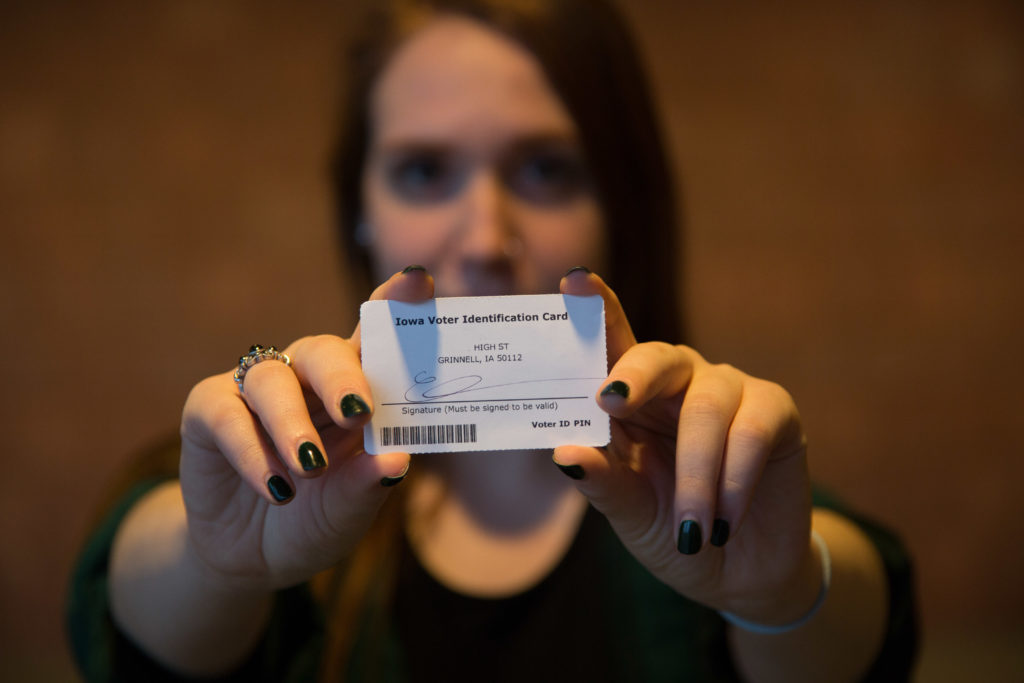Earlier in 2017, Iowa passed a bill containing changes to the voter identification laws. The legislation stipulates that each Iowa voter must have either a voter identification card issued by the state, an Iowa driver’s license, an Iowa non-operator’s ID, a U.S. passport, a military ID or a veteran’s ID in order to vote. This is a change from previous regulation wherein registered Iowa voters were not required to show an ID when voting.
The process of integrating the voter identification cards into the voting system is beginning with a soft rollout. Individuals with the new identification card can begin to use it, but those who have not yet received their copy are allowed to present other forms of identification and sign an affidavit, for the time being.
The bill originated in the Republican-controlled Iowa Senate as a solution to voter fraud, though the presence of systematic voter fraud has never been demonstrated.
“Often times [what is considered voter fraud] is just record keeping issues, which happens. If you have a 99.9 percent success rate, [then] a certain amount of mistakes will happen in the record keeping process. The important thing to know is that voter identification does not prevent this from happening,” said Austin Wadle ’18, President of Grinnell College Campus Democrats.
Additionally, the new laws stipulate that a person who happens to move between elections must now provide address documentation that is less than 45 days old. Otherwise, same-day registration processes are unchanged.
This new bill is a challenge for Iowans who moved within the state soon before Election Day, and for new voters who simply may not have the required documentation. Further, this bill affects Iowa’s absentee voting rules by reducing how far in advance ballots are mailed out.
“At the end of the day, this bill doesn’t affect the average voter. But that’s not what matters. It’s how it affects the inconsistent voter, the voter that’s consistently marginalized because of their economic or work situation or their living situation. … It’s important to keep in mind that while this doesn’t affect most people, it’s going to affect the populations that are most vulnerable,” Wadle said.
Much of the discussion surrounding this bill has included charges of voter suppression, especially in regard to college students. The claims are based on the fact that transient individuals, such as college students, are often moving and therefore have a harder time providing residency documentation.
Additionally, college students in Iowa are least likely to have state issued identification, such as a driver’s license, making them even more negatively affected by this bill.
“As Grinnell College students, we’re moving almost every year to a new physical address. … Moving every year makes you less likely to be registered at your current address, and so even if you have a voter identification card that got sent to you last time you registered, often times that voter identification card will be out of date,” Wadle said.
A voter identification card is an additional thing that people have to remember to bring with them to the polls. In some cases, additional requirements have the potential to discourage many individuals from voting.
Wadle stresses that students should make sure that they are registered and check their mail for their voter identification cards. If students have not received their card or cannot locate it, it is easy and free to request a replacement from the county auditor. In some cases, it may have been sent to a student’s home address during winter break.
“It’s just one of those things,” Wadle said, “like your Saint’s Rest bean card, to just keep in your wallet in all times with you. Have it become part of what you keep as a set of things that you need.”
The next local election takes place on Tuesday, Feb. 6.




































































